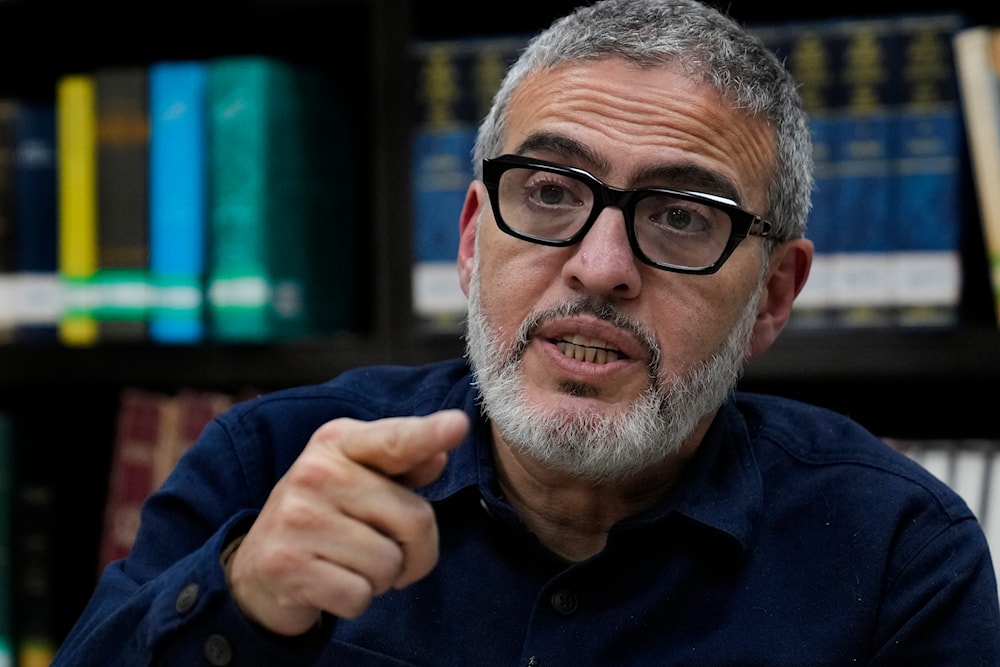Slow death, no anesthesia; Abu Sitta recalls horrors he saw in Gaza
Palestinian doctor Ghassan Abu Sitta says the aggression on Gaza surpassed the horrors of all the wars and conflicts he had worked in.
-

Doctor Ghassan Abu Sitta, a Palestinian-British plastic surgeon specializing in conflict medicine, speaks during an interview with The Associated Press at the Institute for Palestine Studies in Beirut, Lebanon, Saturday, Dec. 9, 2023. (AP Photo/Hussein Malla)
Palestinian doctor Ghassan Abu Sitta spent 43 days under fire in Gaza. What he witnessed during his voluntary work in the besieged Strip's hospitals left him with a lot to tell about the Israeli atrocities committed against civilians.
When he left Gaza because he could no longer perform surgeries due to a shortage of medical equipment, he decided to advocate for the Strip through other means.
Speaking to AFP, Abu Sitta details the testimony he provided to the British police regarding attacks against civilians and the types of weapons used, hoping it will lead to trials for war crimes.
The results of the Israeli aggression on Gaza, where Abu Sitta arrived on October 9 as part of the Doctors Without Borders team, surpassed the horrors of all the wars and conflicts he had worked in before, including Gaza, Iraq, Syria, Yemen, and southern Lebanon.
"It's like the difference between a flood and a tsunami; the scale is entirely different," he expressed, emphasizing the large number of casualties, martyred children, the magnitude of the disaster, and the intensive bombings, causing the Gaza healthcare system to be overwhelmed within days of the war's start.
Having worked for weeks in hospitals in #Gaza during the Israeli aggression on the Strip, renowned British-Palestinian plastic surgeon, Dr. Ghassan Abu Sitta bore witness to the horrific crimes that were committed there.#PalestineGenocide#GazaUnderAttack pic.twitter.com/aOVCQuh0lF
— Al Mayadeen English (@MayadeenEnglish) December 11, 2023
The Palestinian doctor pointed out that from the beginning, the capacity was lower than the number of patients that had to be treated, adding that doctors had to make difficult decisions about whom to treat.
He recounted the case of a 40-year-old man with a head shrapnel injury who needed X-rays and examination by a neurosurgeon, but those were not available as told to the patient's family who stayed around the stretcher he was placed on that night until his martyrdom in the morning.
Anesthesia and painkillers quickly ran out in hospitals, forcing Abu Sitta to perform painful cleaning procedures for wounds on injured individuals without the possibility of relieving their pain. He made it clear that this was the only available option, or else see the wounded succumb to widespread inflammation in the blood.
Abu Sitta also confirmed that he treated people with burns caused by white phosphorus, which is prohibited by international law, explaining that it is an injury that can be distinguished from other injuries and that phosphorus continues to burn into the deeper parts of the body until it reaches the bones.
Since returning to Britain, the Palestinian doctor has spent most of his time alerting political leaders and humanitarian organizations to the situation in the Gaza Strip. In this regard, he said that he is trying to help the patients in Gaza as much as he can by conveying their voices abroad.
He also noted that he informed the London police about the injuries he witnessed, the types of weapons used, and the use of white phosphorus, as well as the attacks against civilians.
Elsewhere, Abu Sitta, who narrated how he survived the al-Ahli Baptist Hospital massacre on October 17, concluded by stressing that "ultimately, justice will reach these individuals, after five or ten years, or when they are in their eighties, when the balance of power in the world allows justice for the Palestinians."
Read more: 'Israel', in pursuit of more damage, pain, goes after heritage in Gaza

 3 Min Read
3 Min Read








